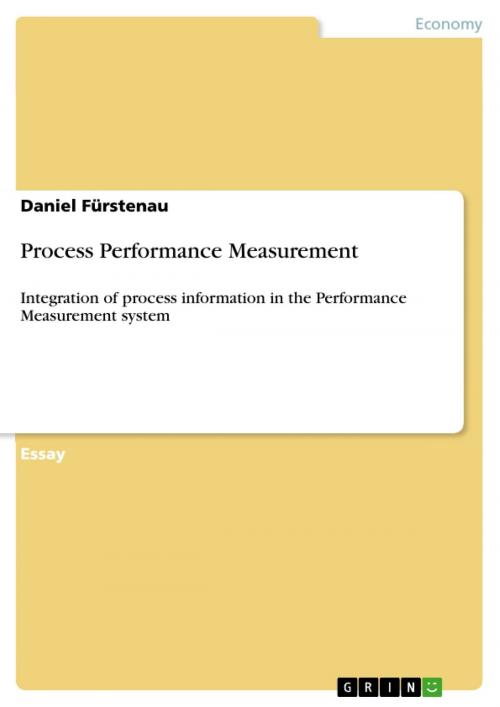Process Performance Measurement
Integration of process information in the Performance Measurement system
Business & Finance, Accounting, Financial| Author: | Daniel Fürstenau | ISBN: | 9783638041218 |
| Publisher: | GRIN Publishing | Publication: | April 29, 2008 |
| Imprint: | GRIN Publishing | Language: | English |
| Author: | Daniel Fürstenau |
| ISBN: | 9783638041218 |
| Publisher: | GRIN Publishing |
| Publication: | April 29, 2008 |
| Imprint: | GRIN Publishing |
| Language: | English |
Essay from the year 2008 in the subject Business economics - Controlling, grade: 1,0, Åbo Akademi Universität, Finnland ( Åbo Akademi Universität, Finnland, Department of Business Studies), course: Essay on Accounting, 123 entries in the bibliography, language: English, abstract: A lot of particularly big companies are nowadays in the position to provide comprehensive information about critical business processes to decision-makers nearly in real-time with low additional efforts. Information about those processes can be traced through information technology, aggregated and analyzed and used for management decision-making. Still these possibilities are not fully recognized and realized. Aim of this work is therefore to examine the thesis that direct activity/process information must be taken into stronger account for management control and that the management accounting system must adopt the changing organizational and environmental realities by developing and implementing mechanisms to model the process perspective and integrating process information. The integration of process information enhances continuous improvement by providing up-to-date, and easy to understand and interpret measures on the local level that forces immanent response and leads to actions based on observable derivations from defined process objectives. After essential definitions about Management Accounting, Performance Measurement, and Business Process Management criticism on traditional performance measures is presented (chapter 3.1). Further, arguments that underpin the need to change the Performance Measurement system according to the changes that are implied by a process-based view on the organization are given and aggregation issues are discussed (chapter 3.2). Afterwards, concepts for integrated Performance Measurement systems, e.g. based on the Balanced Scorecard and process measurement frameworks like SCOR or EFQM, that integrate process information are presented (chapter 3.3). In the last chapter (3.4) the opportunities and threats of information systems for a process-based Performance Measurement in general are discussed, and finally a number of recent approaches in academic research and practice to integrate process information in the Performance Measurement System, such as Process Mining and Business Activity Monitoring, are introduced.
Essay from the year 2008 in the subject Business economics - Controlling, grade: 1,0, Åbo Akademi Universität, Finnland ( Åbo Akademi Universität, Finnland, Department of Business Studies), course: Essay on Accounting, 123 entries in the bibliography, language: English, abstract: A lot of particularly big companies are nowadays in the position to provide comprehensive information about critical business processes to decision-makers nearly in real-time with low additional efforts. Information about those processes can be traced through information technology, aggregated and analyzed and used for management decision-making. Still these possibilities are not fully recognized and realized. Aim of this work is therefore to examine the thesis that direct activity/process information must be taken into stronger account for management control and that the management accounting system must adopt the changing organizational and environmental realities by developing and implementing mechanisms to model the process perspective and integrating process information. The integration of process information enhances continuous improvement by providing up-to-date, and easy to understand and interpret measures on the local level that forces immanent response and leads to actions based on observable derivations from defined process objectives. After essential definitions about Management Accounting, Performance Measurement, and Business Process Management criticism on traditional performance measures is presented (chapter 3.1). Further, arguments that underpin the need to change the Performance Measurement system according to the changes that are implied by a process-based view on the organization are given and aggregation issues are discussed (chapter 3.2). Afterwards, concepts for integrated Performance Measurement systems, e.g. based on the Balanced Scorecard and process measurement frameworks like SCOR or EFQM, that integrate process information are presented (chapter 3.3). In the last chapter (3.4) the opportunities and threats of information systems for a process-based Performance Measurement in general are discussed, and finally a number of recent approaches in academic research and practice to integrate process information in the Performance Measurement System, such as Process Mining and Business Activity Monitoring, are introduced.















